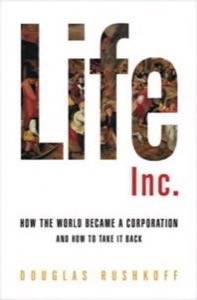Douglas Rushkoff — author, documentarian, and teacher — is a man on a mission. As a step towards getting “people to see the software-like code lying underneath how they interact,” his latest book, Life, Inc., explores the nature of money, our economic system, and how a corporate mindset has shaped who we are as people in modern society.

As a media theorist who’s written about some of the most influential ideas of the digital age, Rushkoff is second to none. In Life Inc., he describes not just corporations, but how we all can change to an “open source economy” that favors decentralized value creation over banking and central currency. We spoke with him to ask more about what this new economy would look like and how the Web is involved.
How The Web Broke The Economy
ReadWriteWeb: I was particularly struck by how you position the Web as a way for individuals to create things of value for each other, as the door to an open source economy. Can you describe what an open source economy looks like, and what role software and the Web have to play in that?
Douglas Rushkoff: This program written by central banking and corporatist monopolies was created to favor people who had money and wanted to make money without creating value. Technology broke the monopoly centralized banking had on value creation by allowing people to develop things at low cost. The gift economy that really the real Internet was built on is anathema to the GNP.
RWW: Will enterprise software follow the same trend? What role is there for business-to-business transactions in the decentralized economy you’ve laid out?
R: When I’m at the supermarket, every once in a while the cash register crashes and they restart it and they see Windows. I get the feeling that the manager and the cashier and everyone in there thinks that this shouldn’t be running Windows. They’re thinking, oh my god, they’re using amateur-level software. You want to think that these are proprietary perfect registers.
My feeling is that businesses and the IT of business are going to want a higher order of quality. They are going to proprietary super-pro enterprise OS’s. I feel business is going to want something like the business-only IBM computer, and I think that’s not a bad thing.

Localized Currencies & Technology
RWW: You tell a fascinating story about investing in a local restaurant called Comfort, where you created “comfort dollars” that gave the owner cheaper capital and your community more food. Do you see that kind of special currencies as being viable for technology investment? Can the Internet be used for localized currency?
R: I certainly hope so. The great thing about software is that you don’t need a bank. But you do see every transaction, software is just really really good for that. You can see how money if flowing, how transactions are flowing. The problem with our economy is that when speculators are extracting currency, money comes first. In a distributed system money is the result of transactions.
The main thing standing in the way of it is that people don’t believe its possible. It’s not they can’t do it, it’s that they can’t see it. It’s like when you show someone Linux for the first time.
A New, Collaborative Mindset
RWW: In the book, you make a connection between the Renaissance, with both social change and the art and science that focused on the ideal of a master painter or scientist, and the individualistic mindset that allows modern capitalism to function. Do you see social networks and collaborative software has having a comparable effect on our mindset?
R: Renaissances tend to reverse whatever the last one created. This one is towards decentralized partner collaboration and the sharing of value. So for sure, and we’re going to get different kinds of discoveries. I think that the computer may be the most central thing to making all of this happen.
A Word for Developers & Entrepreneurs
RWW: What message would you give to people who are going to be building the software to run this open source economy?
Rushkoff: My biggest message to them is this…There’s this prevalent notion that the reason you get involved is that you create a business that you then sell. I would argue that is not the path to greatest fulfillment, that it’s not the path to the greatest technology. The less you borrow, the less you will be required to grow, and the closer you can stay to those growth metrics that are more appropriately scaled.
Life, Inc. is in bookstores now. If you’re seeking a primer on the book and Rushkoff’s conception of what corporatism means, be sure to watch the short Life, Inc. The Movie below










